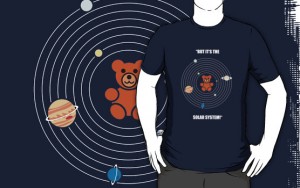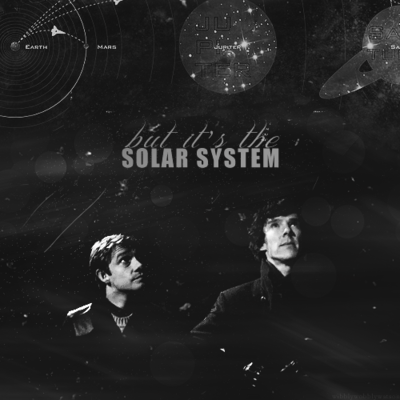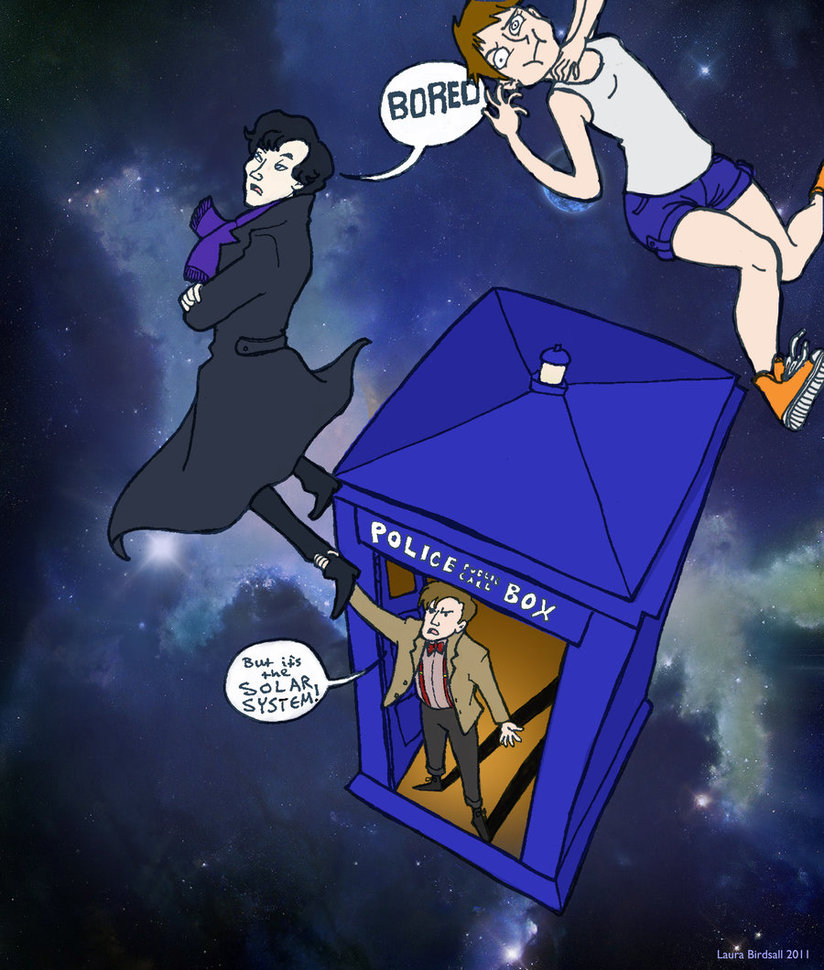“But It’ s The Solar System!”
In keeping with the spirit of Year of the Solar System, I am going to write about two of my latest obsessions in one post: the Solar System and the BBC series Sherlock.

Let me start by saying that I am a big fan of Sherlock. (And, in case you’re wondering: yes, the homoeroticism is one of my favorite aspects of the series.) After having said that, I will now proceed to criticize a view of science encouraged by Arthur Conan Doyle’s character. In other words, I am going to argue why Sherlock should give a damn about the Solar System.
In Doyle’s Sherlock novel A Study in Scarlet, Dr. John Watson was surprised to discover that Sherlock Holmes does not know, nor does he care, that the Earth revolves around the Sun. In Watson’s own words, Holmes’s knowledge about astronomy, among other things, was “next to nothing.” Holmes’s lack of knowledge about the Copernican theory is especially surprising given that he knows so much about things like the appearance of different kinds of cigar ash.

In the novel, Holmes defended his cluelessness about astronomy by likening his mind to an attic with limited space. He said that he couldn’t be bothered to remember useless trivia that have no relevance to his work as a detective. After all, knowing what different kinds of ash look like helped him solve a case, but knowing that the Sun is the center of the Solar System did not. In the BBC series, Sherlock’s defense went like this, “Oh hell, what does the solar system matter? So we go round the sun. If we went round the moon or round and round the garden like a teddy bear it wouldn’t make any difference. All that matters to me is the work. Without it my brain rots.”
To this, all that Watson could retort was, “But it’s the Solar System!” I wonder why this line by Watson is not as popular as it should be.

Given that Sherlock Holmes probably has Asperger syndrome (the BBC Sherlock describes himself to be a “high functioning sociopath”), maybe we can forgive him for knowing so many trivial things but not knowing that the Earth revolves around the Sun. This should not, however, be used by people who want an excuse for skipping out on their basic science.
More importantly, Sherlock’s apathy towards fundamental scientific concepts betrays a deep misunderstanding of the structure of science. Let us look at two of the most glaring deficiencies in Sherlock’s conception of science, which are (a) his unfamiliarity with the principle of consilience and (b) his lack of appreciation for the principle of parsimony.
Consilience
The Merriam-Webster Dictionary defines consilience as the “linking together of principles from different disciplines especially when forming a comprehensive theory.” The word has been around for some time now, although it recently regained currency thanks to E.O. Wilson’s wonderful book, Consilience: The Unity of Knowledge (1998).

Although the dictionary definition is useful in its rigidity, I would like to use Wilson’s subtitle, ‘the unity of knowledge’, as my definition of consilience. Although this definition is rather vague, it’s just what I need to illustrate why Sherlock should give a damn about the Solar System.
I respect Sherlock’s view that one should not waste one’s brainpower on useless trivia. The basic concepts of science, however, are not useless trivia for the reason that there is a unity of knowledge in science. In other words, scientific theories cannot be treated in isolation of each other. If you do not understand how the Solar System behaves, then your understanding of gravity will be limited. If you have a limited grasp of how gravity works, then you easily end up believing a lot of wrong things, like how the positions of the planets at the time of your birth determine your destiny.
While a lot of scientific facts are better left to the specialists, there is a set of fundamental scientific concepts that every educated person should know because they are connected in countless ways to our daily life. Let’s call such scientific concepts keystone concepts. Keystone concepts are concepts one must comprehend in order to formulate a consistent theory of the world. And one needs a consistent theory of the world in order to make the correct decisions when necessary. (“Should I buy a cheap plot of land near the Marikina Fault Line?” “Are genetically modified crops bad for me?” “Should I vote for a politician who denies global warming?”)

The Copernican theory is a splendid example of a keystone concept. Sherlock, who is a detective, should know better that the Copernican theory is intimately linked with the theory of gravity, which in turn dictates how bullets behave when fired from the barrel of a gun; planetary astronomy, as it should be clear to anyone who understands science, cannot be separated from ballistics.
Other examples of keystone concepts in science are the atomic theory, the theory of evolution by natural selection and the germ theory of diseases.
What I find beautiful about scientific consilience is the fact that you do not need to memorize so many scientific facts in order to have a full grasp of the world around you. Like Sherlock, I believe that remembering so many facts that have no relevance to your life is wasteful and counterproductive. However, because there is consilience in science, knowing that the Earth goes round the Sun is not an isolated fact but should be part of a web knowledge that informs our view of the world.
Furthermore, consilience makes it easier to take in new facts because learning something new does not involve remembering it by rote. Rather, because of the unity of knowledge, new facts about the world can be easily incorporated into our worldview. Hence, knowing the keystone concepts of science such as the theory of evolution helps us save on brainpower rather than waste it. We can state this fact in another way: keystone concepts help us organize our knowledge in such a way that makes acquisition of new information easy. To use Holmes’s attic analogy in Scarlet, being familiar with the keystone concepts help us tidy up that attic that is our mind so that it becomes easier for us to decide which piece of information is truly useless and which is helpful.
As a matter of fact, in the BBC series, Watson gets the last laugh when Sherlock discovers that in order to solve the mystery, a little background knowledge on astronomy is helpful after all.

Parsimony
In dismissing the Copernican theory as useless trivia, Sherlock fails to grasp another principle of science called parsimony.
As it is usually presented, parsimony describes the simplicity of an explanation. The most parsimonious explanation is one that explains the most with the fewest assumptions. Closely linked with the principle of parsimony is the famous Occam’s razor. Occam’s razor says that in choosing between competing logically consistent explanations, one must choose the simplest explanation.

The parsimony I want to talk about in relation to Sherlock and the Solar System, however, is the simplicity that comes in accepting a scientific worldview.
The world around us is exploding with an almost endless parade of seemingly unrelated phenomena. However, if one has a scientific view of things, one discovers that beneath all this complexity is an underlying simplicity (a phrase I got from Jong Atmosfera).
Take the heliocentric model of the Solar System. In this model, the Sun is the center of the Solar System and the planets, along with asteroids and comets, revolve around it. This model of the Solar System beautifully, and simply, explains so many things that are relevant to our daily lives. For example, combined with the fact that the Earth’s axis is tilted, it explains why we have seasons. It also explains why we have tides, why our Moon has many phases, why the Sun rises in the east and sets in the west, and why a year is approximately 365 days long. Our knowledge of how the Earth goes round the Sun also helps us adjust our calendars accordingly so that we can better order our lives around the passage of the seasons.
On a more romantic but still scientific level, knowing how our Solar System is configured gives us clues to our origins, which in turn tell us a lot about who we are. It is our knowledge of our cosmic neighborhood that enabled us to surmise the fact that we are in truth made of stardust, and that we are products of more than 4 billion years of evolution on a lonely piece of rock that floats in the vastness of space. Far from being mere romantic knowledge, such realizations provide us with powerful insights into human nature. If natural selection operating on a bunch of stardust produced us, then what does that say of us? If we want to control our destiny as an individual and as a species, we must know the answer to this very important question.
And if Sherlock wants to read people like books, it would certainly help him to know where humans figure in the grand scheme of the cosmos.

Why You Should Give A Damn About The Solar System
Yes, you can live a full life without bothering to know the first thing about the Solar System. However, I hope I have convinced you that life is simply so much better knowing the Earth goes round the Sun. And it certainly is a lot less boring.

Photo credits:
- redbubble.com
- beyondhollywood.com
- theculture.org
- blog.naver.com
- savagechickens.com
- e-booksdictionary.com
- mariboccful.tumblr.com
- xiiiskies.tumblr.com
- ladskipdepiss.tumblr.com


please make an article about ur thoughts on stephen hawking:
http://curiosity.discovery.com/topic/space-explor…
i love ur articles…. <3<3<3
wala na pecier. mahal na kita. at mas lalo ko pang minahal si sherlock holmes. simplicity and relatedness, basic building blocks for more complex philosophies.
—In 'The Musgrave Ritual,' Sherlock Holmes did some calculations of the Sun's position so as locate the buried treasure.
—In 'The Greek Interpreter,' Holmes and Watson were having a conversation over tea, that included the topic of the change in the obliquity of the ecliptic.
C'mon. He's a badass.
Which simply proves my point — that it would help him a lot to know his astronomy. 😀
And, btw, I agree that he's a badass. Didn't I make that clear in my opening paragraphs?
Sure, Holmes is well acquainted with astronomy. Of course he knows the Copernican theory. 🙂
Interestingly, Benedict Cumberbatch also played another S.H., Stephen Hawking that is, in the 2004 BBC tv-film “Hawking”.